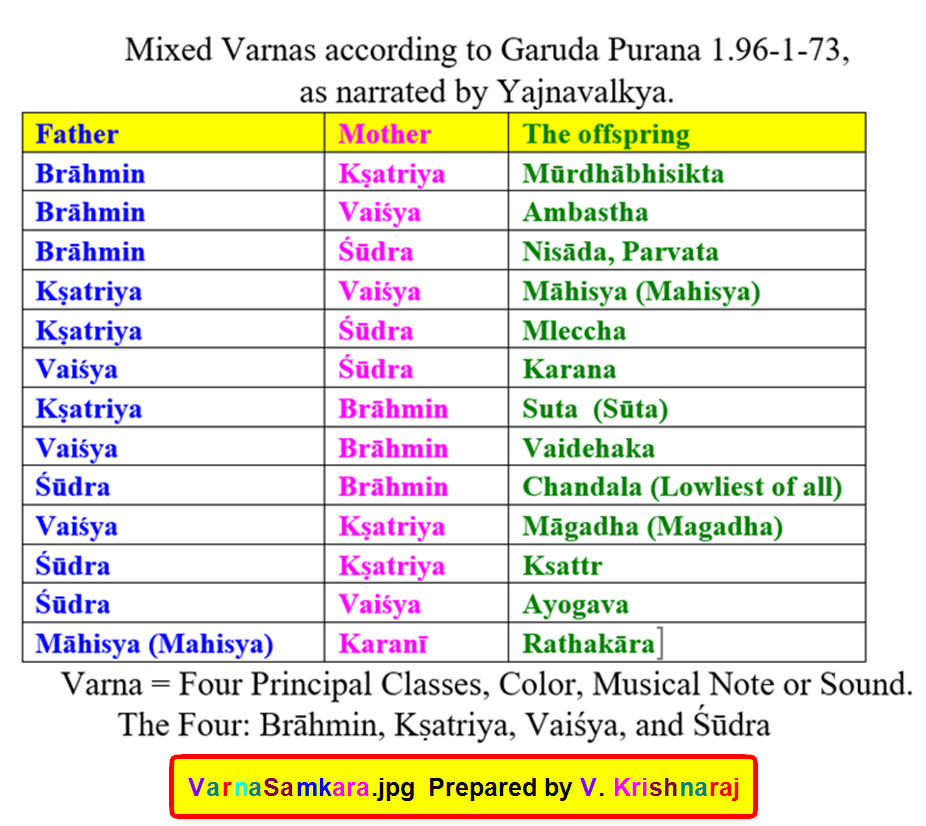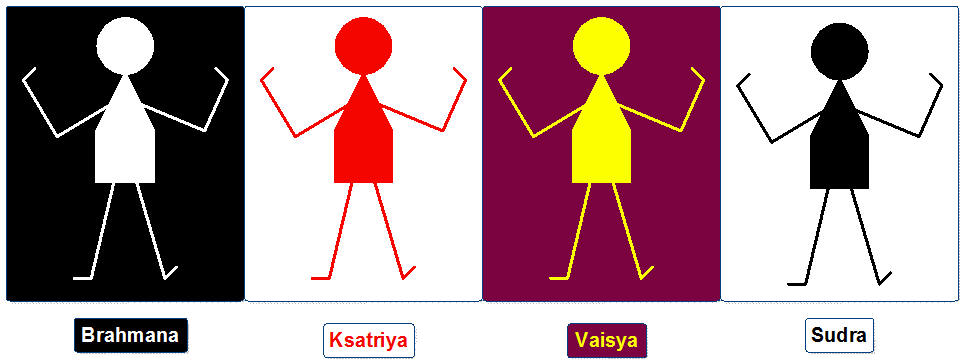By Periyava
Translated from
Tamil: V. Krishnaraj
http://www.kamakoti.org/tamil/part1kural31.htm
தர்மங்களின் பாகுபாடு : தெய்வத்தின் குரல் (முதல் பகுதி)
Division of Labor: Deivathin Kural
The smooth functioning of the society depends on many factors. Work with
Buddhi and work with body: There are many subdivisions in each category.
All these are essential for the prosperity of the society. It is pure
nonsense to see and say an artificial divide, one being superior and
another being inferior.
Every family needs the essentials: Rice, salt, clothes, books… To
satisfy our needs, we cannot do farming for rice, produce salt by
evaporation of seawater, weave cloth, print books… The plowman plows for
himself but also for others to produce grains. So is the case with each
laborer. Some conduct
commerce, some wage wars… To bring wellbeing of the soul for the public,
some perform Dhyāṉam, Yāgam, Pūjā…
They safeguard Sastras for the weal and wellbeing of the world.
The Dharma Sastras have
well-laid paths and plans for agreeable companionship in the society by
dividing the labor for the mutual benefit of all the people in the
society.
How do we share and divide the labor pool? If division is based on
ability, everyone thinks that he is the most qualified. If mental
aptitude is the criterion, everyone desires for high-ranking jobs. If
that is so, who will do the other jobs? How do we allot jobs in a
harmonious way to suit the needs of the society? Distribution alone is
not enough. How do we allocate labor over generations?
How could it be correct to reach
conclusions based on external examination of one’s ability and mental
aptitude? If all candidates
compete for all positions, how could it be possible? Who is to allocate?
To avoid these pitfalls, allocation of labor on a hereditary basis was
established and came to be Varṇa Dharmam.
Whatever is the hereditary work when done in the spirit of carrying it
out as the injunction from Paramesvara with the realization of doing it
for the world welfare, that itself for an individual is soul welfare.
Various observances are
favorable for liberation of the Jīvā while pursuing his chosen
profession. How could it be
possible for a hard-working laborer to be asked to observe fasting?
Śarīra
pōṣaṇam (சரீர
போஷணம்
= high-calorie nutrition) is unnecessary for a person doing intellectual
work.
They, to shed love of body (= Śarīra-apimāṉam = nourishing the body)
perform a multitude of observances, ritual baths, vows, fasts…
Observances are dependent on work (Physical or mental). Knowing this,
there is no place for fights.
If the meaning and purpose of these rituals are not understood in the
beggining, we should not give up these observances, expend an effort to
do them, will in the future understand their
meaning and welcome their utility. Everyone should protect their own
Dharma and offer help to protect the Dharma of others. Competition and
switching from the birth Dharma to another are not recommended. If
someone decides to give up his traditional and hereditary Dharma, we
should discourage the move and advise him to pursue his own hereditary
birth Dharma. We must further say that it is for the good of him and us.
There is no superior or inferior person based on the job he does. The
sastras have stated the path for the proper functioning of the society
by division of labor. When people engage in vocations according to their
mental inclination, the public good is not served. Everyone wants money
from the other wallet to go into his wallet. Everyone takes the path of
instant riches. There is no proper division of labor for the good of the
world. Therefore, when everyone does his own hereditary birth Dharma,
follows observances appropriate to his Dharma, there will be no
competition and jealousy in the society, public works will go smoothly
and there will be Ātma Parisuddhi (soul purity) for everyone.
Prevention of deformation of
society in the name of reform should be uppermost in the mind.
The government is obligated to provide essential goods and services like
food, clothing, house…, no matter what job one does.
Anything beyond thse needs on the incremental side takes place,
competition and jealousy pop their heads. There is motherlode of
confusion, when monetary fulfillments transcend satisfaction from
others. Godliness as a mental state is fulfillment from doing one’s job
with conscience and dedication; tranquillity is guaranteed everywhere.
There are many kinds of sweets; there are many Rāgās (Melodies). Likewise in the society, many activities must take place in the society in melodic sweetness. Knowing that Rasam (mulligatawny soup) has salt and if you add salt to the sweet drink, that Rasa-ābhāsam (perversion of taste). If you add a svaram (note) of one melody to another melody, that is Rasa-ābhāsam (inappropriate melody and note). Rāgam = melody. Svaram = note. Today’s people have lost the sense of taste or melody. The Bhāgavathars engage in words of ridicule in the middle of narrating the moving stories from Puranas. The congregants enjoy those inappropriate sayings. When there is good nutritious food available, people smoke tobacco with no concern for their health. These are the minor Rasa-ābhāsams (perversion of taste; bad taste in the mouth). The major Rasa-ābhāsam or worse perversion or vulgarity is division of many Special Dharmas beneficial for general Dharma into a multitude of Varnas, causing confusion.
(There are four basic Varnas. By Varna Samkara (mixing of Varnas by
marriage and their progeny), many new recombinant dilute Varnas are
created. Now there are more Varnas than the basic four. The Varna
Samkara and the resulting recombinant dilute Varnas cause confusion. It
leaves a bad taste in the mouth or Rasa- ābhāsam- a vulgar taste in the
mouth. Explanation by V. Krishnaraj)
End of the article by Periyava.
Note of clarification of
பெரிய ரஸாபாஸம்,
பொது தர்மத்துக்கு அநுகூலமான
(benefit, advantage)
பல விசேஷ தர்மங்களை வகுத்துத் தரும் வர்ணங்களைப்
போட்டுக் குழப்புவதே!
Varna = color, musical note or sound,
four principal classes of people (Brāhmans,
Kshatryas, Vaiśyas, Śūdras

